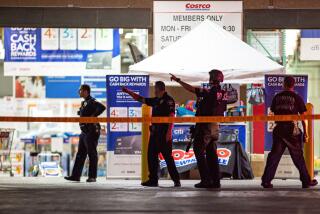Penalty Phase Mistrial Declared in 2 Slayings : Courts: A Northridge man faces a new trial or a life sentence without parole in the sandwich shop killings.
- Share via
A mistrial was declared Monday when a jury was unable to decide on the death penalty or life in prison for a Northridge man convicted of shooting two teen-agers to death at a Subway sandwich shop.
San Fernando Superior Court Judge Ronald S. Coen set a June 11 hearing for Deputy Dist. Atty. Kenneth Barshop to decide whether the prosecutor wants to pursue a new penalty phase in the trial of James Robinson Jr., 24, which would require a retrial because a new jury would have to be impaneled.
Robinson, who was a part-time student at Cal State Northridge at the time of the June 30, 1991, incident, was eligible for the death penalty because he was found guilty May 3 of two counts of murder with the special circumstances that they were multiple murders and were committed during a robbery. Robinson also was convicted of second-degree robbery.
If the prosecutor decides not to seek a new penalty phase, which would probably take two to three weeks to complete, Robinson would be sentenced to life in prison without the possibility of parole. The trial had taken two weeks to complete, and the jury had deliberated three days before finding Robinson guilty of murdering James White, 19, and Brian Berry, 18.
“I’m very disappointed,” Barshop said of the jury, which deliberated two days before announcing it was deadlocked 7 to 5 for the death penalty. “I thought death was the appropriate decision.
“I had some jurors tell me that under no circumstances would they have imposed the death sentence on anyone,” Barshop said. “Another juror supposedly said he wanted to see a videotape of the murder before he would impose the death sentence.” No such videotape existed.
Robinson’s mother and friends testified during the trial’s penalty phase that Robinson was a respectful, well-mannered young man who sought to improve himself by going to college.
Robinson’s attorney, Bruce Hill, said he presented those witnesses to counter the prosecution’s contention that Robinson was a cold-blooded, cruel, callous and vicious executioner.
Hill said some jurors told him that they opposed the death penalty because they had “lingering doubts” about Robinson’s guilt.
Hill hopes prosecutors will not seek to retry the penalty phase.
“This is kind of a classic case where you would expect a split decision,” Hill said. “Life in prison without the possibility of parole still protects society from any potential future danger.”
Some defense attorneys said the Robinson case was a classic example of a convicted murderer being spared the death penalty because he did not fit the stereotype of a vicious killer.
“Because of the defendant’s demeanor in court and his lack of a serious violent background, I’m not surprised by the outcome,” said Deputy Public Defender Charles Klum, who last month defended a double-murder suspect in a case declared a mistrial after the jury deadlocked 8 to 4 for acquittal.
“I think it was helpful that the jury understand where he came from, that they know he has a mother and a sister who he would be leaving behind,” Klum said.
“Usually, in a death-penalty case there is no humanity in the defendant; they are true sociopaths,” said another defense attorney who asked not to be identified. “They are people you can predict would do those kinds of things. They look menacing, they act up in court, they scowl, they look hostile.
“But you didn’t have any of the that in this case. You had a young kid, who, if anything, looked dorky. You had a sense that he got into something way over his head. He just came off rather pathetic.”
During the two-week trial, witnesses testified Robinson was seen at the sandwich shop in the 10300 block of Zelzah Avenue in Northridge just before the shooting. Other witnesses testified Robinson bragged about committing the robbery and slayings. Police found the weapon used in the shootings in Robinson’s apartment.
Robinson admitted being at the scene the night of the killings, but said the two men were already dead when he arrived.
Barshop argued that Robinson committed the robbery for financial gain and killed the two men to eliminate any witnesses.
More to Read
Sign up for Essential California
The most important California stories and recommendations in your inbox every morning.
You may occasionally receive promotional content from the Los Angeles Times.










